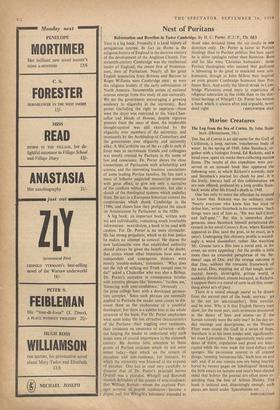Marine Creatures
THE Sea of Cortez is an old name for the Gulf of California, a long, narrow, treacherous body of water. In the spring of 1940, John Steinbeck, to- gether with a biologist friend, Ed Ricketts, and a hired crew, spent six weeks there collecting marine fauna. The results of this expedition were pre- served in an unusual book that appeared the following year, in which Ricketts's scientific data and Steinbeck's journal lay cheek by jowl. It is the lively, literary half of this collaboration we are now offered, prefaced by a long profile Stein- beck wrote after his friend's death in 1948.
One has only to sense the affection he inspired to know that Ricketts was no ordinary man. 'Nearly everyone who knew him has tried to define him,' writes Steinbeck in his memoirs. 'Such things were said of him as, "He was half-Christ and half-goat."' But this is somewhat disin- genuous, since Steinbeck himself perpetrated the remark in his novel Cannery Row, where Ricketts appeared as Doc (and the goat, to be exact, as a satyr). Undergoing this obituary profile is accord- ingly. a weird discomfort, rather like watching Mr. Greene turn a film into a novel and, in the event, no more appealing : for the profile is little more than an extended paraphrase of the 'fic- tional' saga of Doc, and the strange outcome is that Doc, without the romantic framework of the novel, Doc, stepping out of that tough, senti- mental, bawdy, incorrigible, private world, is suddenly diminished, almost betrayed, as Ricketts. I suppose there is a moral of sorts in all this, some- thing about acts of piety.
There is a sound enough moral to be drawn from the second part of the book, anyway : go to the ant (or sea-cucumber), thou novelist, and be wise. Why is it that English literary men show, for the most part, such strenuous disinterest in the dance of bees and atoms—as if the human comedy were the only one? In his day-to- day musings and descriptions, as the Western Flyer went round the Gulf in a series of hops, Steinbeck is at his most tender and, significantly, his most Lawrentian. The aggressively male anec- dotes of thirst, copulation and greed are inter- rupted while the men wade for sand-dollars and sponges. His passionate interest in all created things, 'teeming, boisterous life,' leads him on and out; and, if at one minute you are being heartily bored by twenty pages on 'teleological' thinking, the little essays on laziness and man's boat-shaped mind that bolster the journal are often more re- warding than the best of Aldous Huxley. The book is indexed and, disarmingly enough, such pieces are listed under 'Speculations on . .
JOHN COLEMAN


































 Previous page
Previous page